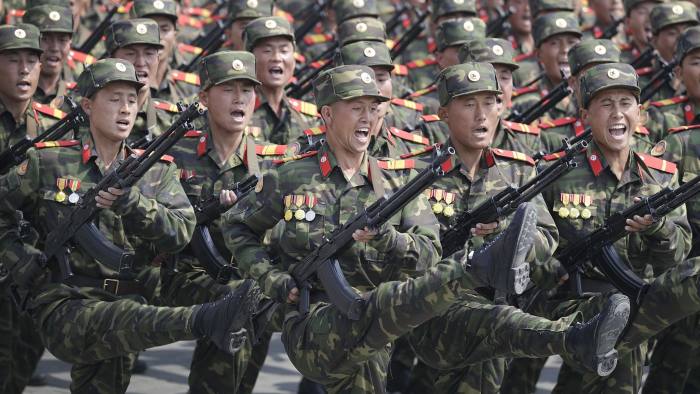By Tom Mitchell and Xinning Liu in Dandong

Defiant North Korea: soldiers on parade in Kim Il Sung Square, Pyongyang
When North Korean traders give Li Jian long lists of the goods they want to buy, he checks the items against a 236-page Chinese translation of the UN sanctions imposed after Kim Jong Un’s regime conducted a fifth nuclear weapons test in September.
“If it’s on the sanctions list, we can’t provide it,” Mr Li said from his office in downtown Dandong, the Chinese border city through which about 70 per cent of Sino-North Korean trade passes.
“Even if we did, the goods would be detained at [Chinese] customs.”
At the weekend, Donald Trump said that the Chinese government could, and should, do more to rein in Mr Kim’s nuclear and ballistic missile programmes.
“China is very much the economic lifeline to North Korea,” he wrote in a tweet.
“So while nothing is easy, if they want to solve the North Korean problem, they will.”
On the Australian leg of his 10-day regional tour, Trump’s vice-president implied that Beijing was already doing more to apply pressure to North Korea.
“We are encouraged by the steps that China has taken so far,” Mike Pence said on Saturday.
The US and its allies are maintaining the military pressure on Pyongyang as well as urging China to use its trade ties to rein in North Korea’s nuclear ambitions.
On Sunday, Japan’s Maritime Self-Defence Force, its navy, confirmed that two of its destroyers would rendezvous with the US aircraft carrier Carl Vinson for exercises in the western Pacific.
China, however, is ambivalent about the benefits of tighter commercial sanctions.
Amid reports of fuel shortages in the North Korean capital Pyongyang, China’s foreign ministry refused to comment on Friday as to whether Beijing was applying pressure beyond that prescribed by the UN.
Traders in Dandong also say that it has been business as usual for non-sanctioned products, although sales of some permitted goods have been affected by apparently tougher economic conditions across the border in North Korea.
Gao Shengye said his Chinese trading company’s sales of steel and other products with potential “dual-use” applications (for military and civilian purposes) had been halted by the sanctions.
“Trade in autos, rice, beans and cooking oils have also been affected because sometimes they can’t pay us,” he said.
Late last week, the economic lifeline Mr Trump referred to was on display just outside Mr Li’s and Mr Gao’s offices in Dandong, which lies on the north bank of the Yalu river.
Dozens of lorries clogged the city centre, awaiting entry to a walled-off Chinese customs facility for final checks before crossing the Friendship Bridge into North Korea.
Most of their cargo was hidden in containers or under tarpaulins, although some flatbed trucks made no attempt to conceal loads including steel pipes and industrial equipment.
At a much larger staging area on Dandong’s north-west outskirts, hundreds of additional North Korea-bound vehicles waited their turn to continue into the city centre and then across the Yalu into North Pyongan province.
Guards prevented visitors from entering the staging area.
But many of the trucks were being loaded in the open, revealing the huge range of products — from apples to lumber — that North Korea still imports from China.
“China must do something to show the world that we are actually helping stop North Korea from developing nuclear missiles,” said Tian Yuzhou, whose company sells cold storage equipment.
“But our business is running OK. North Korean traders still come to us with lists of things they want to buy.”
Aucun commentaire:
Enregistrer un commentaire